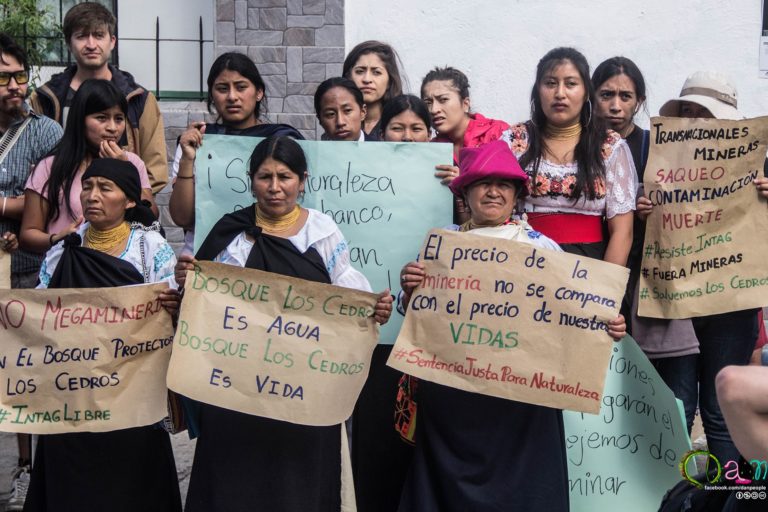In what looks like an unprecedented case, the Constitutional Court of Ecuador used the constitutional provision on the “Rights of Nature” to safeguard Los Cedros protected forest from mining concessions. The Court voted seven in favor and two abstentions.

With the ruling, the Constitutional Court must develop a binding jurisprudence in which the Rights of Nature, the right to a healthy environment, the right to water, and environmental consultation must be respected.
The court decided that activities that threaten the Rights of Nature should not be carried out within the Los Cedros Protected Forest ecosystem, which includes mining and all types of extractive activities. Water and environmental permits to mining companies must also be denied.
Two-thirds of the reserve is covered by mining concessions granted to the Ecuadorian state mining company ENAMI and its Canadian partner, Cornerstone Capital Resources. The Constitutional Court agreed to hear the case in May 2020.
“This case is emblematic not only for Ecuador but also for the international community,” said Alejandro Olivera, senior scientist, and Mexico representative at the Center for Biological Diversity. “This progressing and innovative ruling protects the imperiled wildlife, such as the endangered brown-headed spider monkeys and endangered spectacled bears, from mining companies.
Earth Law Centre, Global Alliance for the Rights of Nature, and the Centre for Biological Diversity filed an amicus curiae (friend of the court) brief in September 2020 before the Ecuadorian Constitutional Court. It asked the court to protect Los Cedros and robustly enforce constitutional provisions that establish basic Rights of Nature, or “Pachamama,” including the rights to existing, to restoration, and the rights of the rivers, especially river Magdalena.
“This is a historic victory in favor of Nature. The Constitutional Court states that no activity that threatens the Rights of Nature can be developed within the ecosystem of Los Cedros Protected Forest, including mining and any other extractive activity. Mining is now banned from this amazing and unique protected forest. This sets a great juridical precedent to continue with other threatened Protected Forests. Today, the endangered frogs, the spectacled bears, the spider monkey, the birds, and Nature as a whole have won an unprecedented battle,” says Natalia Greene, from the Global Alliance for the Rights of Nature.
“It is undoubtedly good news but the situation of the Los Cedros Protective Forest is not an isolated event in Ecuador,” said Constanza Prieto Figelist, Latin American legal lead at Earth Law Centre. “This is a problem of the forests throughout the country. In recent years, mining concessions that overlap with Protective Forests have been awarded.”
The brown-headed spider monkey, found in Los Cedros, has lost more than 80% of its original area of distribution in northwest Ecuador. In 2005 it was estimated that there were fewer than 250 brown-headed spider monkeys globally, granting the species a place among the top 25 most endangered primates in the world.
The groups note that the case is of great significance, both for Ecuador and the world, because it has the potential to establish important and influential “Earth jurisprudence” that will help guide humanity to be a benefit rather than a destructive presence within the community of life.
The proposed mining is unlawful, the groups say, it violates the rights of the Los Cedros Protective Forest as an ecosystem as well as the rights of the many members of that living community.
